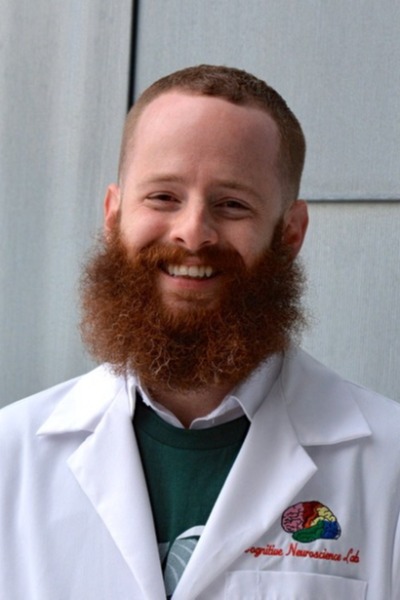Ph.D. student receives prestigious NIH research fellowship

Geo Kartheiser, a second-year student in Gallaudet University's Ph.D. in Educational Neuroscience Program (PEN), has been awarded the prestigious individual National Research Service Award National Institutes of Health (NIH) graduate pre-doctoral fellowship. Geo is Dr. Laura-Ann Petitto's graduate student in her Brain and Language Laboratory for Neuroimaging (BL2).
The fellowship, often referred to as the F31, was designed to foster mentored research training in health-related fields and promotes diversity in the scientific community. It was established in honor of Dr. Ruth Kirschstein, the first woman director of an NIH Institute.
"We congratulate Geo on this wonderful achievement! This award is a great honor for him and for us at our National Science Foundation Visual Language and Visual Learning Center, as well as an affirmation of Gallaudet University as a top-tier site for significant, impactful research," said Pettito. "Importantly, it is a wonderful sign of support for our Educational Neuroscience doctoral program, as Geo won this award while standing in a new program that was only three months old at the time of his application!"
In addition to being mentored by Petitto, Kartheiser received enthusiastic support from Dr. Peter Hauser of the Rochester Institute of Technology who is also a VL2 Science Mentor.
Kartheiser believes his grounding in VL2's training, education, and research were very instrumental in his winning the award.
"NIH is especially interested in those who have identified a specific research interest or project that has been sponsored by a laboratory and demonstrate a strong background in research design and methods through coursework and laboratory rotation," explained Kartheiser.
Kartheiser's research as outlined in the F31 explores how the timing of signed language acquisition yields change in the neural resources facilitating spatial working memory.
"By studying a spatial syntax-based language like American Sign Language, a unique window that would not be possible with spoken language is gained into the structural and functional plasticity of the human brain," he said.
Kartheiser said BL2, affiliated facilities at Gallaudet, and the VL2 network provide him with a supportive, ideal environment including research infrastructure, facilities, and intellectual community for conducting this research. "Being a part of VL2 has afforded me a wealth of resources that has helped me incredibly in my personal and academic endeavors," he said. "The network created by VL2 has permitted me to develop key relationships and receive training from astonishing students and faculty from many different laboratories across the country."
Kartheiser said he would especially like to thank members of the VL2 and Gallaudet communities for their overwhelming support.
"This achievement would not be possible without my wonderful, dedicated primary advisor, Dr. Laura-Ann Petitto, who always made herself and her brilliant mind available to me regardless how occupied she was or where she was located on the planet at the moment; the impeccably designed Educational Neuroscience program and team at VL2 and Gallaudet University; Dr. Clifton Langdon, for letting me pick his brain whenever I faced a roadblock; my 'co-pilot' Adam Stone, for his humor, critical insights, and words of encouragement; Dr. Peter Hauser for his enthusiastic mentorship and devoted support; and the wonderful administrative team at Gallaudet University."
Research reported in this story was supported by the National Institute On Deafness And Other Communication Disorders of the National Institutes of Health under Award Number F31DC014230. The content is solely the responsibility of the authors and does not necessarily represent the official views of the National Institutes of Health.
This content originally appeared on the Gallaudet University website.